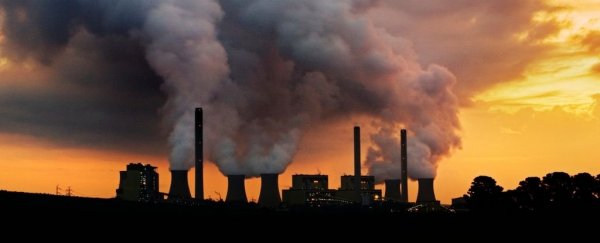Burning fossil fuels doesn't just wreck the environment. It also wrecks human health, and to a very grave extent, new research shows.
Results of a new study combining chemical transport models with data on emissions and particles estimate over a million deaths around the world could have been avoided in 2017 by eliminating fossil fuel combustion.
These deaths, resulting from diseases such as stroke, lung cancer, and respiratory infections, could all be attributed to concentrations of fine particles less than 2.5 microns across (PM2.5) in the atmosphere.
"As the largest number of PM2.5-attributable deaths occurred in China and India, complete elimination of coal and [oil and natural gas] combustion in these two countries could reduce the global PM2.5 disease burden by nearly 20 percent," the researchers write in their study.
Such results help remind us what can be gained if we transition away from fossil fuels, not just for the environment, but also for ourselves. Even when completely ignoring the environmental effects of cutting fossil fuels, the health benefits to humans alone are immense.
PM2.5 pollution is the top environmental risk factor when it comes to global human health. It can be emitted from home heating, cookstoves, dust storms, fires, waste, and international shipping, but a significant portion of it is due to burning fossil fuels.
With high enough concentrations in the air, we know PM2.5 pollution can cause serious problems for human health. This comprehensive new dataset on global air pollution in 2017 now highlights where we need to clean up our act.
While other studies have calculated the health impacts of PM2.5 air pollution, few have attempted to provide a detailed breakdown of all the various sources on a global scale.
In light of this, researchers sought to identify all the deaths attributable to PM2.5 in 2017, including data from 21 regions, covering 204 countries and 200 sub-national areas. The team then further identified which sources of PM2.5 were responsible for these deaths and to what extent.
As it turns out, in 2017, more than 90 percent of the world's population was experiencing levels of PM2.5 higher than those advised by World Health Organization – and a big chunk of that came from fossil fuels.
In fact, roughly 20 percent of all deaths attributable to PM2.5 that year were linked to burning coal, oil, or natural gas, and more than half the lives lost were in China and India.
As shocking as the numbers are, they might even be higher than this. Another recent study using a different measure of air quality and mortality found ten times the number of deaths occurred in 2012.
Where the true numbers sit depends on where we draw the line on mortality risks. It's clear that even conservative estimates aren't good.
While India's use of coal continues to rise, fossil fuel pollution looks to be on the decrease elsewhere in recent years. China, the United States, and some countries in Western Europe, like Germany and Italy, significantly reduced their reliance on coal, and, to a lesser extent, oil and gas.
Oil and natural gas emissions remain the largest contributor to PM2.5 in Egypt, Russia, and the United States.
"Our results show that regions with large anthropogenic contributions generally had the highest attributable deaths, suggesting substantial health benefits from replacing traditional energy sources," the authors write.
How much more convincing do we need?
The study was published in Nature Communications.
